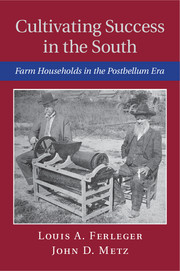
- Publisher:
- Cambridge University Press
- Online publication date:
- August 2014
- Print publication year:
- 2014
- Online ISBN:
- 9781107286177

This book explores changes in rural households of the Georgia Piedmont through the material culture of farmers as they transitioned from self-sufficiency to market dependence. The period between 1880 and 1910 was a time of dynamic change when Southern farmers struggled to reinvent their lives and livelihoods. Relying on primary documents, including probate inventories, tax lists, state and federal census data, and estate sale results, this study seeks to understand the variables that prompted farm households to assume greater risk in hopes of success as well as those factors that stood in the way of progress. While there are few projects of this type for the late nineteenth century, and fewer still for the New South, the findings challenge the notion of farmers as overly conservative consumers and call into question traditional views of conspicuous consumption as a key indicator of wealth and status.
'Ferleger and Metz use an underutilized resource - probate records - to explain household-level production and consumption of yeoman farmers in three Georgia upcountry counties. They supplement probate data with census and Georgia tax data and tell a compelling story about how rural yeoman farmers faced economic and social challenges during the postbellum period. In doing so, they make a worthy contribution to the literature on subsistence farming and postbellum agriculture, introducing historians to a set of underutilized resources that offer details about household behaviors, production, and consumption.'
Peggy Hargis - Georgia Southern University
'This engagingly written, deeply researched, and strongly argued work explores the economic context and material conditions of late nineteenth- and early twentieth-century Georgia farm families. Through a careful quantitative and descriptive analysis of probate, estate sale, and tax records from three Georgia counties, this book provides a rich portrait of the material lives of black and white farmers of middling rank in the New South period.'
Louis Kyriakoudes - The University of Southern Mississippi
 Loading metrics...
Loading metrics...
* Views captured on Cambridge Core between #date#. This data will be updated every 24 hours.
Usage data cannot currently be displayed.